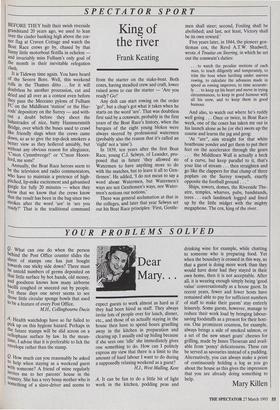SPECTATOR SPORT
King of the river
Frank Keating
BEFORE THEY built their swish riverside grandstand 20 years ago, we used to lean over the cinder banking high above the cor- ner flag at Craven Cottage and watch the Boat Race crews go by, chased by that funny little motorboat flotilla in echelon — and invariably miss Fulham's only goal of the month in their inevitable relegation clash.
It is Tideway time again. You have heard of the Severn Bore. Well, this weekend rolls in the Thames ditto. . . for it will doubtless be another procession, cut and dried and all over as a contest even before they pass the Meccano pylons of Fulham FC on the Middlesex 'station' or the Har- rods' depository on the Surrey — and with- out a doubt before they shoot the balustrades of nice, batty Hammersmith llridge, over which the buses used to crawl like friendly slugs when the crews came down, so as to give the top-deck smokers a better view as they hollered amiably, but Without any obvious reason for allegiance, 'C'trion Cymmbreege!' or 'C'mon Hoorx- ferd, me sons!'
Annually, the Boat Race heroes seem to be the television and radio commentators, who have to maintain a pretence of high- Pitched, lip-mike excitement and galvanised gurgle for fully 20 minutes — when they know that we know that the crews know that the result has been in the bag since two strokes after the word 'are' in 'are you ready?' That is the traditional command from the starter on the stake-boat. Both coxes, having steadied crew and craft, lower raised arms to cue the starter — 'Are you ready? Go!' Any dolt can start rowing on the order 'go!', but a chap's got what it takes when he starts on the word 'are'. That was doubtless first said by a coxswain, probably in the first years of the Boat Race's history, when the barques of the eight young blokes were always steered by professional watermen (probably also the reason that it's called an 'eight' not a `nine'). In 1839, ten years after the first Boat Race, young C.J. Selwyn, of Leander, pro- posed that in future 'they allowed no Watermen to have anything more to do with the matches, but to leave it all to Gen- tlemen'. He added, 'I do not mean to say a word about Watermen, but Watermen's ways are not Gentlemen's ways, nor Water- men's notions our notions.'
There was general acclamation at that in the colleges, and later that year Selwyn set out his Boat Race principles: 'First, Gentle- men shall steer; second, Fouling shall be abolished; and last, not least, Victory shall be its own reward.'
Five years later, in 1844, the pioneer gen- tleman cox, the Revd A.T.W. Shadwell, wrote A Treatise on Steering, in which he set out the coxswain's duties: ... to watch the peculiar motions of each man, to teach diligently and temperately, to trim the boat when lurching under uneven rowing, to calculate the advances made in speed as rowing improves, to time accurate- ly. to keep up his heart and nerve in trying circumstances, to keep in good humour with all his crew, and to keep them in good humour.
And also, to watch out where he's ruddy well going . . Once or twice, in Boat Race week, one of the coxes has taken me out in his launch alone as he (or she) swots up the course and learns the jag and geog: 'At "are", aim straight for that white boathouse yonder and get them to put their feet on the accelerator through the gears . . . the Middlesex Wall is actually a heck of a curve, but keep parallel to it, that's your line of stream. . . then straighten and go like the clappers for that clump of three poplars on the Surrey towpath, exactly opposite the football ground . . . '
Ships, towers, domes, the Riverside The- atre, temples, wharves, pubs, bandstands, trees . . . each landmark logged and lined up by the little midget with the mighty megaphone. The cox, king of the river.


























































 Previous page
Previous page